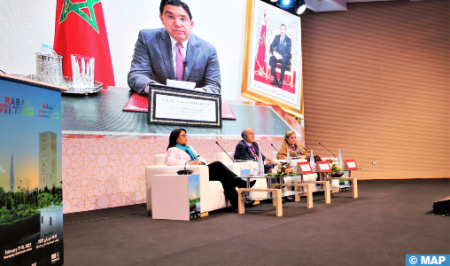Morocco Calls for Renewing Human Rights Diplomacy – FM
The Kingdom of Morocco calls for a renewal of human rights diplomacy because the next few years will be crucial, said Friday the Minister of Foreign Affairs, African Cooperation and Moroccan Expatriates, Nasser Bourita. “The best tool available to the international community remains, without doubt, an ambitious, patient and thoughtful diplomacy that builds, in dialogue and cooperation, an international system of human rights more balanced, which also finds the way to generate a more active discussion on economic and social rights, while global social inequality and economic insecurity deepen, before our eyes, day by day,” said Bourita in a video address at the Rabat Human Rights Pre-Forum. In fact, he argued, “some who have set themselves up as self-appointed evaluators of human rights on our continent stubbornly cling to positions that set aside dialogue and cooperation as the basis for the protection and implementation of human rights in order to adopt, unfortunately, positions of double standards and politicization that, far from serving the cause of human rights, weaken its foundations.” He continued: “There is no tutelage on the issues of human rights, there is no legitimacy of office to dictate external assessments and there is no serious alternative to the gradual ownership, individual and collective universality of human rights. In this sense, he noted that “our path of affirmation on the world stage cannot be taken hostage by the logic of confrontation, which encourages processes of fragmentation that weaken international solidarity in the defense of human rights.” Bourita also pointed out that our continent is called to organize and consolidate its positions in the international debate on human rights that will be announced in the coming years. In the same vein, the Minister noted that the opportunity, even the need, for a new Vienna Convention on Human Rights to develop, modernize and deepen the international human rights system could quickly appear on the international agenda, calling for reflection on the responses to the challenges that arise to give an African touch to this new stage and to promote the universal principles of human rights. He also stressed that Morocco, under the leadership of HM King Mohammed VI, continues to tirelessly promote its national momentum in the field of human rights in their fullness and universality as a vector of development. This irreversible choice, he said, is confirmed by the many advances made in all civil, political, economic, social, cultural and environmental rights. “Human rights and the establishment of the rule of law are, first and foremost, permanent places, today our countries must continue their efforts and actions to strengthen their achievements and create new opportunities, both nationally, regionally and internationally,” he noted. Bourita noted, in this regard, that “it is high time to adopt a cross-sectoral approach by joining a dynamic of deepened cooperation and expanded dialogue between our countries, as we are doing today, on the occasion of this Pre-Forum, and we will soon do in Buenos Aires.” He added that “the greatest lessons, on human rights or any other subject, are not learned from those who think they can give them, but are the result of the actions of those who act.” Organized by the National Human Rights Council, in collaboration with the International Centre for the Promotion of Human Rights (ICPD)-UNESCO, this Pre-Forum is being held as a prelude to the 3rd World Human Rights Forum, which will be held in Buenos Aires next March. Bringing together more than 300 human rights defenders from 50 countries, the two-day pre-forum will focus on challenges and developments in the areas of climate change, transitional justice and memory, and migration.

